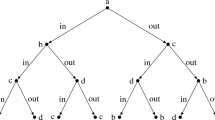Abstract
We study a model in which agents with single-peaked preferences can participate in a costly voting procedure to determine the value of a one-dimensional variable. We show that, for all positive participation costs and all profiles of individual preferences, there exists a unique equilibrium outcome with one single participant whenever the voting rule is strategy-proof, anonymous, and responsive in the sense that the outcome reacts to a unanimous move of the votes of all agents in the same direction; moreover, the single participant is always one of the ‘extremist’ voters, i.e. either one with the lowest or one with the highest peak. While this uncovers a strong tension between strategy-proofness and participation for all deterministic voting rules on the single-peaked domain (just as in the case of an unrestricted domain), there are simple probabilistic and strategy-proof voting rules that induce full participation in equilibrium.
Article PDF
Similar content being viewed by others
Avoid common mistakes on your manuscript.
References
Aumann, R.: Acceptable points in general cooperative \(n\)-person games. In: Contributions to the Theory of Games IV, pp. 287–324. Princeton University Press, Princeton (1959)
Black, D.S.: On the rationale of group decision-making. J. Polit. Econ. 56, 23–34 (1948)
Caragiannis, I., Procaccia, A.D., Shah, N.: Truthful univariate estimators. In Proceedings of the 33rd International Conference of Machine Learning, New York: Curran Associates (2016)
Cohensius, G., Manor, S., Meir, R., Meirom, E., Orda, A.: Proxy voting for better outcomes. In: Proceedings of the 16th International Joint Conference on Autonomous Agents and Multiagent Systems (2017)
Desmedt, Y., Elkind, E.: Equilibria of plurality voting with abstentions. In Proceedings of the EC’ 10, Cambridge, MA: ACM, pp. 347–356 (2010)
Downs, A.: An Economic Theory of Democracy. Harper, New York (1957)
Ehlers, L., Peters, H., Storcken, T.: Strategy-proof probabilistic decision schemes for one-dimensional single-peaked preferences. J. Econ. Theory 105, 408–434 (2002)
Elkind, E., Markakis, E., Obraztsova, S., Skowron, P.: Equilibria of plurality voting: Lazy and truth-biased voters. In M. Hoefer (ed.), Algorithmic Game Theory. SAGT 2015, Springer, pp. 110–122 (2015)
Gibbard, A.: Manipulation of voting schemes: a general result. Econometrica 41, 587–601 (1973)
Jennings, A., Laraki, R., Puppe, C., Varloot, E.: New characterizations of strategy-proofness under single-peakedness. Preprint (2020)
Mavridis, C., Serena, M.: Complete information pivotal-voter model with asymmetric group size. Public Choice 177, 53–66 (2018)
Meir, R.: Strategic voting. Synthesis Lectures on Artificial Intelligence and Machine Learning 12, 1–167 (2018)
Moulin, H.: On strategy-proofness and single-peakedness. Public Choice 35, 437–455 (1980)
–,: Axioms of Cooperative Decision Making. Cambridge University Press, Cambridge (1988)
Nöldeke, G., Peña, J.: The symmetric equilibria of symmetric voter participation games with complete information. Games Econ. Bevav. 99, 71–81 (2016)
Osborne, M.J., Rosenthal, J.S., Turner, M.A.: Meetings with costly participation. Am. Econ. Rev. 90(4), 927–943 (2000)
Palfrey, T.R., Rosenthal, H.: A strategic calculus of voting. Public Choice 41(1), 7–53 (1983)
Renault, R., Trannoy, A.: Protecting minorities through the average voting rule. J. Public Econ. Theory 7(2), 169–199 (2005)
Satterthwaite, M.A.: Strategy-proofness and arrow’s conditions: existence and correspondence theorems for voting procedures and social welfare functions. J. Econ. Theory 2, 187–217 (1975)
Selten, R.: Reexamination of the perfectness concept for equilibrium points in extensive games. Internat. J. Game Theory 4(1), 25–55 (1975)
Yamamura, H., Kawasaki, R.: Generalized average rules as stable Nash mechanisms to implement generalized median rules. Soc. Choice Welf. 40(3), 815–832 (2013)
Funding
Open Access funding enabled and organized by Projekt DEAL.
Author information
Authors and Affiliations
Corresponding author
Additional information
Publisher's Note
Springer Nature remains neutral with regard to jurisdictional claims in published maps and institutional affiliations.
Previous versions of this work have been presented at the conference ‘Improving Public Debate and Political Decision Making,’ London, March 2019, the ‘International Conference on Mathematical Programming and Fair Social Decisions,’ Paris, December 2019, in seminars at Université Paris Dauphine, Karlsruhe Institute of Technology (KIT), the University of Vienna, at the COMSOC video seminar series, May 2020, at the COMSOC conference in Haifa, June 2021 and the SAET conference in Seoul, June 2021. We are grateful to the audiences for helpful feedback and comments. Special thanks to Rida Laraki, Reshef Meir, Hervé Moulin, Klaus Nehring, Matías Núñez, Martin Osborne and Marcus Pivato for particularly helpful comments and suggestions. We also thank two anonymous referees of this journal for constructive feedback that helped improving and generalizing the analysis. All errors are our own.
Rights and permissions
Open Access This article is licensed under a Creative Commons Attribution 4.0 International License, which permits use, sharing, adaptation, distribution and reproduction in any medium or format, as long as you give appropriate credit to the original author(s) and the source, provide a link to the Creative Commons licence, and indicate if changes were made. The images or other third party material in this article are included in the article’s Creative Commons licence, unless indicated otherwise in a credit line to the material. If material is not included in the article’s Creative Commons licence and your intended use is not permitted by statutory regulation or exceeds the permitted use, you will need to obtain permission directly from the copyright holder. To view a copy of this licence, visit http://creativecommons.org/licenses/by/4.0/.
About this article
Cite this article
Müller, M., Puppe, C. Strategy-proofness implies minimal participation under single-peakedness. Econ Theory Bull 11, 131–151 (2023). https://doi.org/10.1007/s40505-023-00247-5
Received:
Accepted:
Published:
Issue Date:
DOI: https://doi.org/10.1007/s40505-023-00247-5



